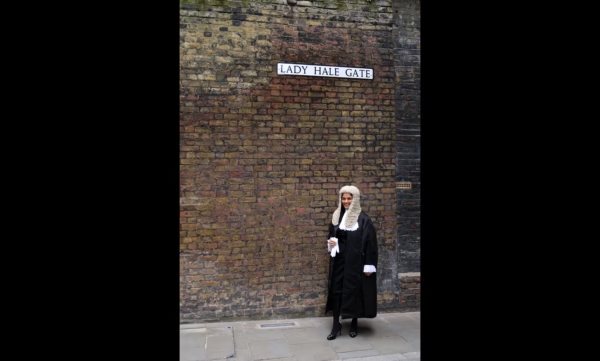
Introduction
Welcome to the June edition of the Property Newsletter from Hardwicke.
We are delighted that Brie (head of our Property Team) is now also our joint Head of Chambers together with PJ Kirby KC. This is as they celebrate 28 years of being chambers roommates!
In this month’s newsletter, Karl King investigates the recreational easement – A New Species Fit for the Modern Life? and James Hall spins the Wheel of Questions.
Lina Mattsson – Editor
Activity Report – What we have been up to
Brie Stevens-Hoare KC has been busy with trusts of land, a bit of land registration and easements – but mostly she was trying to persuade people to stand against her in the Head of Chambers election. No joy on that last task – such is life Brie.
John de Waal KC is fighting a 10 day trial which is all about a defective wastewater treatment plant at a livestock market in Devon – it’s a glamorous life!
This month Amanda Eilledge has been advising on the priority of equitable charges, a local authority’s powers to sell land and now has her head down preparing for a 10 day trial involving property fraud, rectification and subrogation.
Andrew Skelly has had several successful mediations – dealing with Japanese knotweed, and inheritance Act / ToLATA claims.
James Hall has been dealing with rectification of a transfer and adverse possession, and yet more professional negligence arising out of business tenancy renewal errors; as well as answering the dreaded Wheel Of Questions!
They say a change is as good as a rest and Charlotte John has spent much of May taking a break from her usual diet of property and probate disputes to prepare for and sit her final Society of Trusts and Estates Practitioners exam and shadowing a District Judge as part of her training following her appointment as DDJ.
John Clargo has dealt with discontinuous leases, restrictive covenants and option agreements. What more could a man ask for?
Daniel Gatty was successful in a trial to recover monies obtained by fraud. Back in Chambers, he has been busy advising and drafting about topics as diverse as conveyancing negligence, prescriptive easements and dilapidations.
Jamal Demachkie has had a varied month, splitting his time in the High Court and local County Courts seeking injunctions against trespassers, arguing restrictive covenants, and attending his first CCMCs of the year (which are just as tedious as he remembers!).
Steven Woolf extended his property practice to the foreshore of a river with various possession claims against boats unlawfully moored. Makes a change from dealing with caravans and mobile-homes which has been the focus of the majority of his attention this month as he continues working to protect green spaces from unlawful encampments.
Laura Tweedy is enjoying keeping up a busy work load before her maternity leave starts in August. She has been dealing with a lot of social housing work, particularly Equality Act damages claims. As for real estate she has been enjoying advising (not only because it means she can sit down all day!) on matters such as lease interpretation and business tenancies.
Peter Petts has been largely engaged in prosecuting and defending injunctions. Spring is in the air and litigants are getting feisty.
After a month of back-to-back trials and appeals Lina Mattsson has put her OOO on and is now off on maternity leave until the beginning of November! She is so relieved that her baby did not appear in the middle of a trial (as happened last time). Lina will however be working here and there on on-going matters (as she just can’t stay away!).



Recreational Easement – A New Species Fit for the Modern Life
As the pursuit of recreational and leisure activities becomes a significant part of our use and enjoyment of property, the signs are that the law of easements is trying to keep pace, evolving and adapting to comprehend and protect new and emerging rights
Lina Mattsson: Did you see? You may have missed...
Loxleigh Investments Ltd v Dartford BC [2019] EWHC 1274 (Ch), 24 May 2019
Construction of overage provisions – detailed planning permission – summary judgments
Lina Mattsson acted for the successful local authority in a summary judgment application in relation to overage payments due under a transfer agreement.
The Facts
In 2012 the Council obtained outline planning permission for the erection of five detached houses on land it owned. The outline planning permission was granted subject to a number of reserved matters. In March 2013 the Council sold the land to a property developer, Loxleigh. The transfer included overage provisions. They provided that an “Additional Payment” would be payable “If a Planning Permission is granted at any time during the Overage Period” for the construction of a unit over 3,000sqf. “Planning Permission” was defined in the transfer as “any detailed Planning Permission which grants planning permission for the construction of Units”. The Overage Period was “5 (five) years starting on the date of this transfer”.
Loxleigh applied for, and was granted, approval of details in respect of the reserved matters. Overall, permission was granted for four houses with internal areas greater than 3,000 sqf.
Loxleigh completed the houses in 2018 and the Council requested payment in respect of the four houses. Loxleigh denied that any overage was payable asserting that no “Planning Permission” was granted during the overage period, only the approval of the reserved matters and conditions.
The Decision
Master Clark granted the Council’s summary judgment application. She held that the case turned upon the contraction of “detailed planning permission” as contained within the transfer. She noted that the phrase “detailed planning permission” is not defined in legislation, but it is generally used in textbook and case law to describe planning permission obtained following the approval of the reserved matters in an outline planning permission. The word “any” was apt to include more than one type of detailed planning permission: either the grant of full planning permission for another development, or an approval or consent pursuant to the outline permission. Master Clark distinguished the cases relied upon by Loxleigh to say that the approval of reserved matters or permission for non-material changes were not a “planning permission”. These cases concerned with the meaning of “planning permission” in the legislation, and were therefore of no assistance in construing the meaning of “detailed planning permission” in the transfer.
Master Clark rejected Loxleigh’s argument that an overage could by definition only relate to an unpredictable event, and could therefore not relate to the approval of reserved matters as these were not “unpredictable in nature”. She also rejected Loxleigh’s argument that the court should adopted a strict approach to the construction of overage provision. There was no support in the case law for such proposition.
In the circumstances Loxleigh had no real prospect of successfully defending the Council’s claim and there was no other compelling reason why it should be disposed of at a trial.
“Hardwicke Unrobed” - Get to know us better
Each month, a member of our property team has to spin ‘the Wheel of Questions’ and answer the first three questions that come up. This month, James Hall tried his luck with the wheel.
Q: What are you reading currently?
A: I confess to not reading a great deal outside of work, because cases tend to be so document-heavy and I prefer Netflix (other streaming services are available). I mainly read when on holiday! However, the novel I am currently (slowly) reading is ‘The Long Mars’ by Terry Pratchett and Stephen Baxter (part of the ‘Long Earth’ series, about dimension-hopping!). Very good if you like gentle science fiction.
Q: If you could win an Olympic medal for any sport, what would it be?
A: Squash! Firstly because it’s my favourite sport, and the only sport I have played regularly since leaving school (though I did play Ultimate Frisbee for a few years – yes that genuinely is a competitive sport); secondly because it’s still not actually an Olympic sport, even though there have been many campaigns for it to become such and there are some frankly dubious sports which have been allowed in instead!
Q: What’s the first concert you attended?
A: The first one (beyond going to a gig in the local pub) was the Phoenix Festival in 1996 (at the tender age of 19), in Long Marston Airfield near Stratford upon Avon. At the time, the Phoenix Festival, Glastonbury and Reading were the major music festivals. I saw: Foo Fighters; Alanis Morrisette; Manic Street Preachers; David Bowie; Bjork; the Cardigans; Fun Lovin Criminals; the Prodigy; Dodgy; Beck; Neil Young; Massive Attack; Flaming Lips; Skunk Anansie…pretty epic stuff. Crowdsurfing, hoses to keep the crowd cool in blazing heat, and a severe lack of toilets and showers!!
Want to try yourself?
Contact us
If you would like to discuss any of the topics in this newsletter, please contact a member of our Practice Management Team: